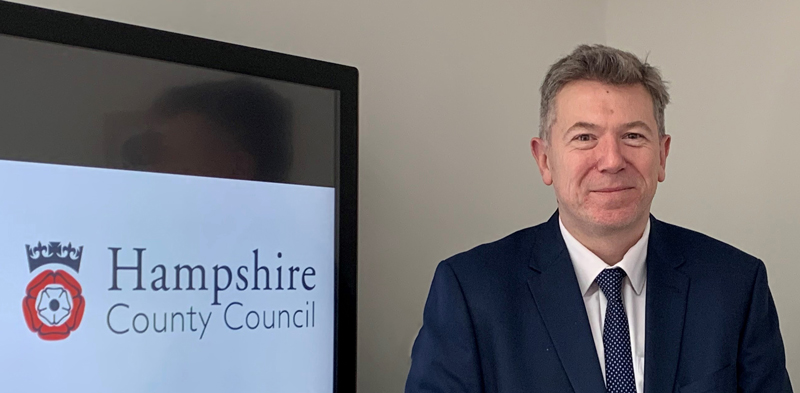It’s a baptism of fire for Steve Crocker, as he takes the reins at the Association of Directors of Children’s Services. He reveals to Jess Staufenberg his views on last week’s white and green papers
Last Friday was Steve Crocker’s first day as president of the Association of Directors of Children’s Services – and my goodness, he’d chosen quite the week to begin.
The Department for Education this week dropped both the schools white paper and the SEND green paper. Together, they arguably propose the biggest upheaval in council education powers since 2010.
Crocker now represents all the directors of children’s services in councils, who will be tasked with implementing many of the changes. He is mainly positive about the two papers (with a few well-placed warnings): “This is not a panacea, but I genuinely think this is a step in the right direction,” he says.
Is this just careful diplomacy, given he needs to survive his one-year presidency? I joke.
“No,” he smiles. “If I really wasn’t happy with the green paper – and colleagues in DfE know me all too well – I am capable of expressing my views clearly.”
Before we delve into the proposals, Crocker, who started off as a residential children’s home manager in 1989, outlines what children’s services are currently required to do. It’s an awful lot, it turns out.

First, there’s safeguarding – which takes in everything from overseeing elective home education, finding and placing ‘children missing in education’ and brokering in-year school admissions for excluded children.
They must also deliver early help for families, run social care intervention, residential care provision for children in care, and oversee children in foster families.
Children’s services also have a “general duty to ensure that children receive a good quality of education”, says Crocker – so most local authorities do school improvement work. He says this includes school visits “almost like a mini-Ofsted”.
(As a case in point, he was asked to become director of children’s services on the Isle of Wight, while also director in Hampshire, to drive school improvement there, and he remains director of both.)
Another big responsibility is school admissions, meaning “who goes where according to a school’s admissions policy”. Offers for secondary school places from councils, for instance, went out this month.
The final huge area that children’s services are responsible for – and the biggest focus for the SEND green paper – is ensuring pupils with special educational needs and vulnerable pupils are receiving the right education.
This includes whether they need an education, health and care plan, as introduced under the Children and Families Act in 2014. The long delays to plans, and soaring numbers of parents taking councils to tribunals over them, are some of the nightmare outcomes of the 2014 reforms.
To make matters worse, trying to cover all these duties has resulted in a £1 billion deficit in councils’ dedicated schools grants.

Crocker is candid about what’s gone wrong.
“The simple way to think about it is the LA is the gatekeeper into the special educational needs system, and what the 2014 act did was widen the gate, and loosen the bolts on that gate.
“We can argue if that was right or wrong. But many more children came through, and that doesn’t matter – as long as you fund it properly.
“Schools can get frustrated with local authorities, we know that, but we’ve been frustrated for a long time that our duties have not matched our powers.”
We’ve been frustrated for a long time that our duties have not matched our powers
This is partly why the wording in the schools white paper has given Crocker cause for celebration. It says that “schools, trusts and local authorities have unclear – and often overlapping – roles and responsibilities” which have resulted in children falling through gaps.
Instead, the government promises to “back local authorities with new legal powers to match their responsibilities”.
For Crocker, the most significant of these would be proposed “backstop powers” in the SEND green paper for councils to force academy trusts to admit children as a “final safety net”.
“We’ve been seeking this for some time. Most trusts and standalone academies work gainfully with local authorities on admissions. When it occasionally becomes a problem, shall we say, this power would simply make it a level playing field for all schools.”
Indeed, academies knowing local authorities held this power would make collaboration more likely, he adds.
He’s also delighted the schools white paper gives councils the power to set up academy trusts for their maintained schools.

“I think this is a really positive step. Particularly councils with lots of small or rural schools, it’s very difficult for heads to see any advantage in becoming a standalone academy, where many of those schools feel very positive about being in the local authority family.”
It also helps resolve the lack of academy trust sponsors in some areas, he adds. “It’s something we’ve pushed for, for a long time. In my local authority, 94 per cent of schools are good or outstanding. Why would we not be able to run a MAT?”
Does it seem ridiculous it’s taken 12 years, since the 2010 Academies Act, for the government to admit councils can be trusted with schools? Crocker laughs. “You’d have to ask the DfE that question, not me.”
The newfound trust does come with threats from the DfE, however. The SEND green paper says government will look more closely at “how high-needs budgets are spent, to ensure value for money is achieved”, with local authorities needing to draw up new “local inclusion plans”.
If found lacking, a “change in leadership” in local authorities will be on the cards. Is Crocker worried?
He is equanimous. “I think it’s a little bit of a red herring. I’ve never met a director of children’s services who doesn’t want to do their job well.”
The issue that needs solving, he says, is that so many staff in the system, including teachers, are “under duress” and “being pulled in different directions”. (It’s also not actually certain the DfE has the legal powers to fire staff in children’s services.)
This is partly due to the overstretched high-needs block, says Crocker – and the knock-on effects for schools left to pick up the pieces.
It’s not clear yet whether the money announced will be enough. Before both papers, the government had already pledged £1 billion for children with high needs in 2022-23, and £2.6 billion in capital funding over three years for new high-needs provision.
The spending review also announced £300 million for the government’s ‘safety valve’ intervention programme for local authorities with the highest deficits.
There’s no new money in the SEND green paper outside of £70 million for a “SEND and alternative provision change programme” to “test and refine key proposals”. I ask Crocker if it’s enough.
“There is provision to begin to address the £1 billion deficit,” he begins evenly. “But in the end, that deficit will become an even bigger problem, if we don’t achieve the reforms that the green paper has set out to do.”
Here we come to his key concern – that the proposals will not get rid of the costly problems already in the system. These include expensive private special needs school placements, and EHCPs the council can’t afford.
Even with a lack of funds, can Crocker defend the fact that 96 per cent of tribunals over high-needs provision go in favour of the family? “The reality is, alongside the 2014 reforms, we are also still charged with managing the public purse.
“That’s what we’re required to do, and to test those things out in law. Nothing would make me happier than to be able to afford to exceed everybody’s wishes.”
Nothing would make me happier than to be able to afford to exceed everybody’s wishes
The green paper has come up with various ways to solve this: a ‘national framework of funding bands’ for high needs would supposedly provide more consistency between areas (which Crocker is in favour of, if it takes account of differences in local living costs), while digital EHCPS can streamline processes (Crocker says most councils have these already).
But the biggest suggestion is mandatory mediation between councils and families before tribunal. Currently, families can get a ‘certificate’ of mediation before going to court, but Crocker is clear this is often a tick-box exercise.
He welcomes the mandatory element of mediation, but emphasises it must be genuinely “meaningful”, adding “exactly how you make that happen is a very tricky thing”.
Interestingly, he wonders whether EHCPs will become “less tailored and specific, and more banded and general”, leading to fewer sticking points between councils and families.
All in all, it looks like a new era for local authorities in which they are more trusted and authoritative partners with schools.
Given that people like Crocker are warmly supportive of academy trusts, and deeply focused on issues such as the crisis in NHS mental health services and rising child poverty, these are partners that are perhaps coming at exactly the right time for schools, who share the same concerns.
But these huge challenges mean the green and white papers are only the start for Crocker.
“What we really need is a proper ten-year plan for children,” rather than piecemeal strategies, he concludes. “This country has never had that. That’s what we need.”














Your thoughts